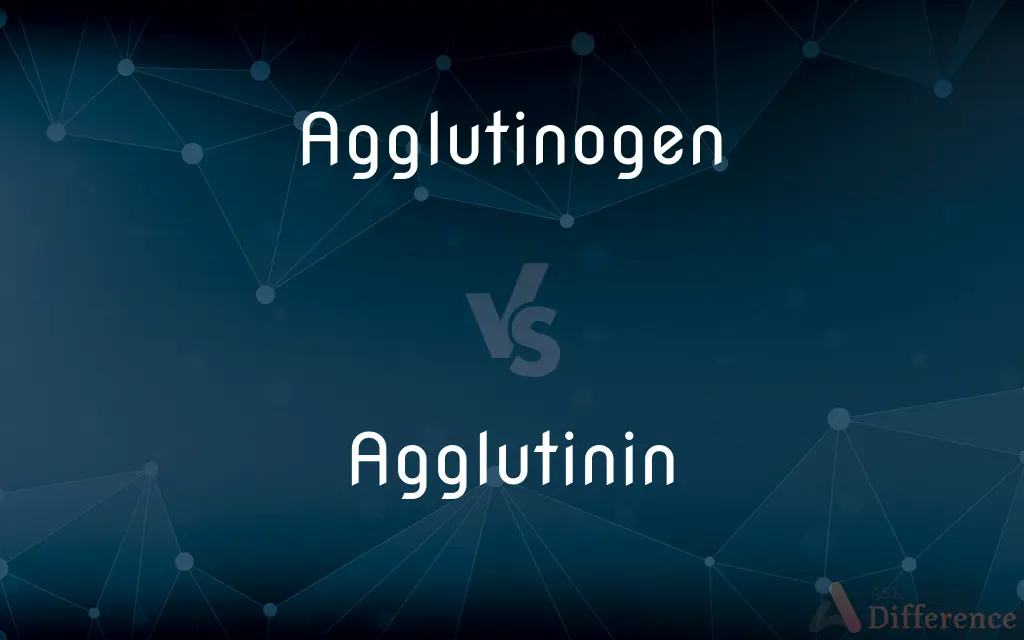Agglutinogen vs. Agglutinin — What's the Difference?
By Maham Liaqat & Urooj Arif — Updated on April 7, 2024
Agglutinogen is a substance that stimulates the production of agglutinins, which are antibodies causing agglutination. Agglutinin, on the other hand, is the antibody that reacts with agglutinogen to cause agglutination.

Difference Between Agglutinogen and Agglutinin
Table of Contents
ADVERTISEMENT
Key Differences
Agglutinogens are specific antigens found on the surface of red blood cells, prompting the immune system to produce antibodies. Whereas agglutinins are those specific antibodies produced by the immune system in response to the presence of agglutinogens. They play a critical role in blood transfusion compatibility and immune reactions.
The primary function of agglutinogen is to act as a marker that identifies cells to the immune system, which can trigger a protective response. On the other hand, agglutinins serve as defenders that bind to agglutinogens, leading to the agglutination of cells, a process crucial for identifying and neutralizing potential threats.
Agglutinogens vary widely among individuals, contributing to the diversity of blood types in the human population. This variability is a key factor in blood transfusion reactions. Agglutinins, conversely, are produced according to the specific agglutinogens they encounter, making the immune response highly specific and effective against certain antigens.
In medical diagnostics, the presence of specific agglutinogens on red blood cells is identified using serological tests, which are vital for blood typing and ensuring transfusion safety. Agglutinins are used in these tests to determine the presence or absence of corresponding agglutinogens, highlighting their diagnostic importance.
Understanding the interaction between agglutinogens and agglutinins is essential for the field of immunohematology, which deals with blood transfusions and the immune response to blood cell antigens. This knowledge helps prevent adverse reactions during transfusions and is fundamental in transfusion medicine.
ADVERTISEMENT
Comparison Chart
Definition
An antigen that induces the production of an agglutinin.
An antibody that causes agglutination by binding to antigens.
Role
Acts as a marker for immune recognition.
Binds to and agglutinates cells with specific antigens.
Importance in Medicine
Determines blood type and compatibility for transfusions.
Used in diagnostic tests for blood typing.
Response Trigger
Stimulates the immune system to produce specific antibodies.
Produced by the immune system in response to agglutinogens.
Examples in Application
Blood typing, identifying possible transfusion reactions.
Blood typing tests, identifying compatible blood donations.
Compare with Definitions
Agglutinogen
Agglutinogens are found on the surface of cells and can vary among different organisms.
The presence of specific agglutinogens is what determines an individual’s blood type.
Agglutinin
Agglutinin is an antibody that causes agglutination of cells by binding to specific antigens.
Anti-A agglutinin will cause agglutination of cells that present the A antigen.
Agglutinogen
Agglutinogens play a key role in immunological recognition and response.
Detecting specific agglutinogens helps diagnose certain diseases.
Agglutinin
The presence of agglutinins in the blood is used for blood typing and compatibility tests.
The agglutination reaction in a blood test can reveal the presence of specific agglutinins.
Agglutinogen
In blood transfusion, agglutinogens must be matched to prevent adverse reactions.
A patient with type B blood has B agglutinogens that can react with anti-B agglutinins.
Agglutinin
Agglutinins play a crucial role in the body’s defense mechanism by clumping foreign cells.
Agglutinins can neutralize pathogens by agglutinating them, making them easier targets for phagocytes.
Agglutinogen
Agglutinogen is an antigen that prompts the immune system to produce agglutinins.
The A antigen on red blood cells is an agglutinogen that causes the production of anti-A antibodies.
Agglutinin
The specificity of agglutinins allows for targeted immune responses.
Agglutinins against the influenza virus are specific and will not react with other viruses.
Agglutinogen
Agglutinogens are crucial for the specificity of the immune system's response.
The immune system targets pathogens based on the unique agglutinogens they carry.
Agglutinin
Agglutinins are produced by the immune system as a response to foreign agglutinogens.
Vaccination can lead to the production of specific agglutinins against pathogens.
Agglutinogen
An antigenic substance present in blood cells, bacteria, etc., which stimulates the formation of an agglutinin in blood serum.
Agglutinin
An agglutinin is a substance in the blood that causes particles to coagulate and aggregate; that is, to change from fluid-like state to a thickened-mass (solid) state.Agglutinins can be antibodies that cause antigens to aggregate by binding to the antigen-binding sites of antibodies. Agglutinins can also be any substance other than antibodies, such as sugar-binding protein lectins.
Agglutinogen
An antigen that stimulates the production of a particular agglutinin, such as an antibody.
Agglutinin
An antibody, lectin, or other substance that causes agglutination.
Agglutinogen
(biochemistry) Any antigen that stimulates the production of an agglutinin
Agglutinin
An antibody or other substance that is capable of causing agglutination, as of red blood cells or bacteria.
Agglutinogen
Any substance that acts as an antigen to cause agglutinin production
Agglutinin
A substance that causes particles or cells to clump#Verb; it may be an antibody, a lectin, or otherwise.
Agglutinin
(specifically) A protein found in cow's milk.
Agglutinin
An antibody that causes agglutination of a specific antigen
Common Curiosities
How do agglutinogens and agglutinins interact?
Agglutinins bind to agglutinogens, leading to the agglutination of cells, which is a critical aspect of the immune response and blood transfusion compatibility.
Why are agglutinogens and agglutinins important in blood transfusions?
They determine blood type compatibility, preventing adverse reactions during transfusions by ensuring the donor's agglutinogens match the recipient's agglutinins.
Are agglutinogens the same as antigens?
Agglutinogens are a type of antigen specifically involved in the agglutination process but are part of the broader category of substances that can elicit an immune response.
What is agglutinogen?
Agglutinogen is an antigen on the surface of cells that triggers the immune system to produce specific agglutinins.
Can agglutinins cause disease?
While agglutinins themselves are not disease-causing, inappropriate or excessive agglutination can lead to health issues, such as in autoimmune diseases or incompatible blood transfusions.
How are agglutinins used in medical diagnostics?
They are used in blood typing tests to determine blood group compatibility and diagnose certain diseases.
What is agglutinin?
Agglutinin is an antibody produced by the immune system that binds to specific antigens, causing agglutination.
Can agglutinins be found in all types of blood?
Yes, agglutinins are present in the plasma of all blood types, but their specificities vary depending on the individual’s blood type.
What role do agglutinogens play in the immune system?
Agglutinogens act as markers that help the immune system recognize and respond to foreign cells or pathogens.
Is it possible to have no agglutinins?
No, agglutinins are naturally occurring antibodies in the body's immune system, although their levels and specificities can vary.
Share Your Discovery

Previous Comparison
Mustaches vs. Moustache
Next Comparison
Snitch vs. NarcAuthor Spotlight
Written by
Maham LiaqatCo-written by
Urooj ArifUrooj is a skilled content writer at Ask Difference, known for her exceptional ability to simplify complex topics into engaging and informative content. With a passion for research and a flair for clear, concise writing, she consistently delivers articles that resonate with our diverse audience.













































